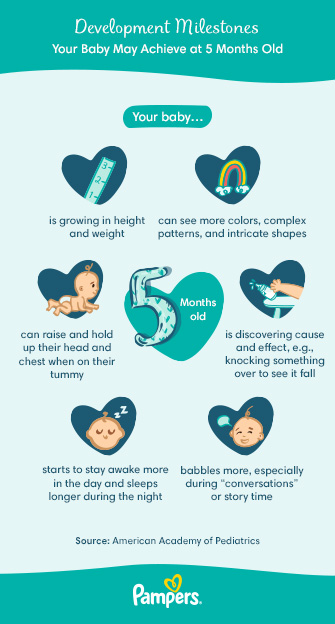
5-Month Baby Care: A Comprehensive Guide for Parents
Introduction
The fifth month marks a significant milestone in a baby’s development. At this stage, your little one is becoming increasingly interactive, curious, and expressive. As a parent, it’s crucial to understand the unique needs and care requirements of a 5-month-old baby to ensure their optimal growth and well-being. This comprehensive guide will provide you with all the essential information you need to navigate this exciting phase of your baby’s life.
Physical Development
- Weight and Height: By 5 months, most babies weigh between 12 and 16 pounds and measure around 24 to 26 inches in length.
- Motor Skills: Your baby’s motor skills are rapidly developing. They can now roll over from their back to their tummy and vice versa. They may also start to sit up with support and reach for objects with both hands.
- Sensory Development: Your baby’s senses are becoming more refined. They can now recognize familiar faces and objects, track moving objects with their eyes, and distinguish between different sounds.
Cognitive Development
- Language Development: Your baby is beginning to understand the meaning of certain words and phrases. They may start to babble and make sounds that resemble words.
- Social Development: Your baby is becoming more social and interactive. They enjoy playing with you and other people, and they may start to show affection by smiling and reaching out.
- Emotional Development: Your baby is experiencing a wider range of emotions. They may express joy, excitement, sadness, and anger.
Feeding
- Breastfeeding: If you are breastfeeding, your baby will continue to nurse frequently, around 8-12 times per day.
- Formula Feeding: If you are formula feeding, your baby will typically drink 4-6 ounces of formula every 3-4 hours.
- Introducing Solids: At around 5 months, you can start introducing solid foods to your baby. Begin with pureed fruits and vegetables, such as applesauce, bananas, or sweet potatoes.
Sleep
- Sleep Patterns: Most 5-month-old babies sleep for 14-16 hours per day, including naps.
- Naps: Your baby will typically take 2-3 naps per day, each lasting around 1-2 hours.
- Nighttime Sleep: Your baby may sleep for 6-8 hours at night without waking.
Diapering
- Diaper Changes: You will need to change your baby’s diaper frequently, around 8-10 times per day.
- Diaper Rash: Diaper rash is common in babies. To prevent it, change your baby’s diaper promptly, keep the area clean and dry, and apply a diaper cream.
Bathing
- Frequency: You can bathe your baby 2-3 times per week.
- Temperature: The water should be warm, around 90-95 degrees Fahrenheit.
- Safety: Never leave your baby unattended in the bath.
Health and Safety
- Immunizations: Your baby will need to receive several immunizations at 5 months, including the DTaP (diphtheria, tetanus, and pertussis) vaccine and the Hib (Haemophilus influenzae type b) vaccine.
- Safety Precautions: As your baby becomes more mobile, it’s important to take safety precautions. Keep your baby away from stairs, sharp objects, and other potential hazards.
- Teething: Your baby may start teething around 5 months. Symptoms include drooling, irritability, and chewing on objects.
Bonding and Play
- Bonding: Spend plenty of time interacting with your baby through eye contact, talking, and playing.
- Play: Engage your baby in age-appropriate activities, such as playing peek-a-boo, singing songs, and reading books.
- Tummy Time: Give your baby plenty of tummy time to help strengthen their neck and back muscles.
Common Concerns
- Colic: Colic is a common condition in babies that causes excessive crying. It typically resolves by 4 months of age.
- Constipation: Constipation can occur if your baby is not getting enough fluids or is taking certain medications.
- Diarrhea: Diarrhea can be caused by infections, allergies, or other factors. It’s important to keep your baby hydrated if they have diarrhea.
When to Seek Medical Attention
- Fever: A fever over 100.4 degrees Fahrenheit is a sign of infection and requires medical attention.
- Persistent Crying: If your baby cries inconsolably for more than 3 hours, it could be a sign of a medical condition.
- Vomiting or Diarrhea: If your baby is vomiting or has diarrhea for more than 24 hours, it’s important to seek medical attention.
- Difficulty Breathing: If your baby is having difficulty breathing or is wheezing, seek medical attention immediately.
Conclusion
Caring for a 5-month-old baby is a rewarding and challenging experience. By understanding your baby’s unique needs and providing them with the necessary care and support, you can help them thrive and reach their full potential. Remember to trust your instincts and consult with your healthcare provider if you have any concerns or questions. With love, patience, and the right information, you can navigate this exciting phase of your baby’s life with confidence and joy.
